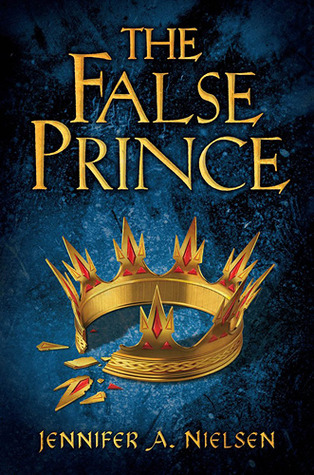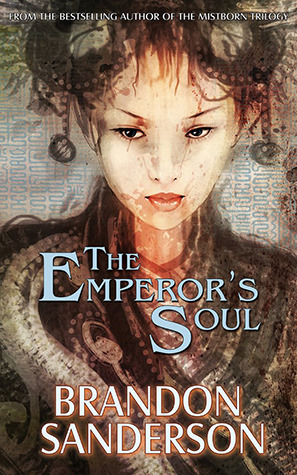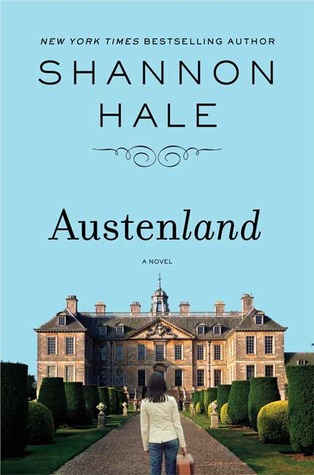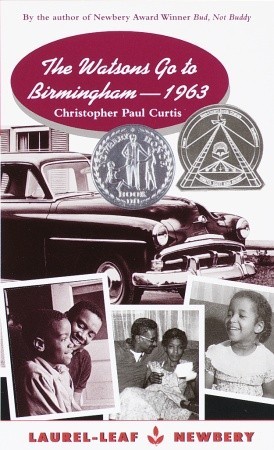Be sure to check out Misty's original post and join the conversation in comments and video responses.
Wednesday, May 29, 2013
Book Chat: Required Reading
I managed to respond to Misty's monthly book chat in a timely manner this time! Yay! This month we're discussing required reading. You can define "required" however you want.
Be sure to check out Misty's original post and join the conversation in comments and video responses.
Be sure to check out Misty's original post and join the conversation in comments and video responses.
Tuesday, May 21, 2013
Review: The False Prince by Jennifer A. Nielsen
The False Prince--Jennifer A. Nielsen
April 2012 by Scholastic
342 pages--Goodreads
THE FALSE PRINCE is the thrilling first book in a brand-new trilogy filled with danger and deceit and hidden identities that will have readers rushing breathlessly to the end.
In a discontent kingdom, civil war is brewing. To unify the divided people, Conner, a nobleman of the court, devises a cunning plan to find an impersonator of the king's long-lost son and install him as a puppet prince. Four orphans are recruited to compete for the role, including a defiant boy named Sage. Sage knows that Conner's motives are more than questionable, yet his life balances on a sword's point -- he must be chosen to play the prince or he will certainly be killed. But Sage's rivals have their own agendas as well.
As Sage moves from a rundown orphanage to Conner's sumptuous palace, layer upon layer of treachery and deceit unfold, until finally, a truth is revealed that, in the end, may very well prove more dangerous than all of the lies taken together.
The False Prince takes some time to get into. It's not really a slow burning plot, it just takes some time to get used to Sage, our lovely narrator. I like a snarky narrator. Sage is not a snarky narrator. He's just obnoxious. He's stubborn and arrogant and, at times, kind of snotty. He gets more likeable as the book goes on, but for the first few chapters, he's just irritating. Once Sage tones down, we get to settle into an interesting plot with some good political machinations and scheming. And secret passage ways. And dagger wounds.
The plot twist is good, but I saw it coming. Neilsen may have dropped too many hints or I may have read enough books that I know what to expect out of stories like this. Either way, the twist left me feeling a bit betrayed. This is a first person narrative; we're supposed to know everything that our main character knows. That Sage pulls out all this secret information at the end of the book is cheating, even if it does make the climax more exciting.
I would have liked to see more development out of Conner. We've got a guy who develops a complicated political scheme that requires delicacy and precision. Neilsen could do so many cool things with a silver-tongued manipulator or misguided patriot. Instead, Conner just ends up as the bad guy who is bad because the plot requires a villain in a stock character sort of way.
Even as the beginning of a series, The False Prince can stand well as an independent novel. And not that it matters much to the plot, but why would you name one of your villains Cregan when you could name him Kregan? Come on! The letter K is so much more aggressive looking.
April 2012 by Scholastic
342 pages--Goodreads
THE FALSE PRINCE is the thrilling first book in a brand-new trilogy filled with danger and deceit and hidden identities that will have readers rushing breathlessly to the end.
In a discontent kingdom, civil war is brewing. To unify the divided people, Conner, a nobleman of the court, devises a cunning plan to find an impersonator of the king's long-lost son and install him as a puppet prince. Four orphans are recruited to compete for the role, including a defiant boy named Sage. Sage knows that Conner's motives are more than questionable, yet his life balances on a sword's point -- he must be chosen to play the prince or he will certainly be killed. But Sage's rivals have their own agendas as well.
As Sage moves from a rundown orphanage to Conner's sumptuous palace, layer upon layer of treachery and deceit unfold, until finally, a truth is revealed that, in the end, may very well prove more dangerous than all of the lies taken together.
The False Prince takes some time to get into. It's not really a slow burning plot, it just takes some time to get used to Sage, our lovely narrator. I like a snarky narrator. Sage is not a snarky narrator. He's just obnoxious. He's stubborn and arrogant and, at times, kind of snotty. He gets more likeable as the book goes on, but for the first few chapters, he's just irritating. Once Sage tones down, we get to settle into an interesting plot with some good political machinations and scheming. And secret passage ways. And dagger wounds.
The plot twist is good, but I saw it coming. Neilsen may have dropped too many hints or I may have read enough books that I know what to expect out of stories like this. Either way, the twist left me feeling a bit betrayed. This is a first person narrative; we're supposed to know everything that our main character knows. That Sage pulls out all this secret information at the end of the book is cheating, even if it does make the climax more exciting.
I would have liked to see more development out of Conner. We've got a guy who develops a complicated political scheme that requires delicacy and precision. Neilsen could do so many cool things with a silver-tongued manipulator or misguided patriot. Instead, Conner just ends up as the bad guy who is bad because the plot requires a villain in a stock character sort of way.
Even as the beginning of a series, The False Prince can stand well as an independent novel. And not that it matters much to the plot, but why would you name one of your villains Cregan when you could name him Kregan? Come on! The letter K is so much more aggressive looking.
Sunday, May 19, 2013
Review: The Emperor's Soul by Brandon Sanderson
The Emperor's Soul--Brandon Sanderson
October 2012 by Tachyon Publications
175 pages--Goodreads
Shai is a Forger, a foreigner who can flawlessly copy and re-create any item by rewriting its history with skillful magic. Condemned to death after trying to steal the emperor’s scepter, she is given one opportunity to save herself. Though her skill as a Forger is considered an abomination by her captors, Shai will attempt to create a new soul for the emperor, who is almost dead.
Probing deeply into his life, she discovers Emperor Ashravan’s truest nature—and the opportunity to exploit it. Her only possible ally is one who is truly loyal to the emperor, but councilor Gaotona must overcome his prejudices to understand that Shai’s forgery is as much artistry as it is deception.
Brimming with magic and political intrigue, this deftly woven fantasy delves into the essence of a living spirit.
The Emperor's Soul is Sanderson's usual storytelling, but condensed; rather than juggling three or four intertwined plots and dozens of characters we have one main character, one plot arc. The story is straight forward, but not oversimplified. From the intriguing beginning to the satisfying conclusion, we experience all of Sanderson's skill and style.
We once again get an excellently crafted magic system. Soulstamping, like all of Sanderson's magic systems, has rules and limitations that make sense and pose challenges. Shai is limited in what and how she can forge. Sanderson never has his characters wave a magic wand to fix everything inexplicably. It is much more satisfying when a character has to be creative to work around the limitations in order to find a solution, rather than just poofing everything to perfection.
And the characters are excellent, as always. They are real. Even with the limited amount of time we have to work with in this novella, Shai, Gatona, and the other characters are real, not one dimensional caricatures. They each have motivations, desires, personalities, histories. No one is evil just for the sake of being evil, and no one is angelically good. Everyone has a purpose to what they do. That skill in characterization is what keep me coming back for more.
My only regret is that The Emperor's Soul isn't loner. Sanderson didn't cut the story short or leave dangling plot strings or anything like that. Everything wraps up well and the story is just as long as it needs to be. I just want more. I enjoy Sanderson's storytelling so much, that only getting 200 pages leaves me wanting more. I'll just have to go reread Mistborn.
Shai is a Forger, a foreigner who can flawlessly copy and re-create any item by rewriting its history with skillful magic. Condemned to death after trying to steal the emperor’s scepter, she is given one opportunity to save herself. Though her skill as a Forger is considered an abomination by her captors, Shai will attempt to create a new soul for the emperor, who is almost dead.
Probing deeply into his life, she discovers Emperor Ashravan’s truest nature—and the opportunity to exploit it. Her only possible ally is one who is truly loyal to the emperor, but councilor Gaotona must overcome his prejudices to understand that Shai’s forgery is as much artistry as it is deception.
Brimming with magic and political intrigue, this deftly woven fantasy delves into the essence of a living spirit.
The Emperor's Soul is Sanderson's usual storytelling, but condensed; rather than juggling three or four intertwined plots and dozens of characters we have one main character, one plot arc. The story is straight forward, but not oversimplified. From the intriguing beginning to the satisfying conclusion, we experience all of Sanderson's skill and style.
We once again get an excellently crafted magic system. Soulstamping, like all of Sanderson's magic systems, has rules and limitations that make sense and pose challenges. Shai is limited in what and how she can forge. Sanderson never has his characters wave a magic wand to fix everything inexplicably. It is much more satisfying when a character has to be creative to work around the limitations in order to find a solution, rather than just poofing everything to perfection.
And the characters are excellent, as always. They are real. Even with the limited amount of time we have to work with in this novella, Shai, Gatona, and the other characters are real, not one dimensional caricatures. They each have motivations, desires, personalities, histories. No one is evil just for the sake of being evil, and no one is angelically good. Everyone has a purpose to what they do. That skill in characterization is what keep me coming back for more.
My only regret is that The Emperor's Soul isn't loner. Sanderson didn't cut the story short or leave dangling plot strings or anything like that. Everything wraps up well and the story is just as long as it needs to be. I just want more. I enjoy Sanderson's storytelling so much, that only getting 200 pages leaves me wanting more. I'll just have to go reread Mistborn.
Friday, May 17, 2013
Book Chat: Design Elements
I know I'm super late, but this is a response to Misty's April book chat about design elements, the little touches in the design of a book that add that little extra something. I apologize for the bad lighting and sound for this video. New location and I don't think my camera liked being that close to the modem. Or it's trying to die on me. And I didn't realize I looked so ticked off at the end of the video. Sorry about that.
Let me know what you think in comments here or responses to Misty's original video.
Books Mentioned:
Steel--Carrie Vaughn
Splintered--A.G. Howard
Heist Society--Ally Carter
Strands of Bronze and Gold--Jane Nickerson
Entwined--Heather Dixon
The Evolution of Calpurnia Tate--Jacqueline Kelly
The Strange Case of Oragami Yoda--Tom Angleberger
My Life as a Book--Janet Tashijan
The Mysterious Benedict Society--Trenton Lee Stewart
Harry Potter and the Sorcerer's Stone--J.K. Rowling
The Tale of Despereaux--Kate DiCamillo
Mistborn--Brandon Sanderson
Leviathan--Scott Westerfeld
Let me know what you think in comments here or responses to Misty's original video.
Monday, May 13, 2013
Review: Austenland by Shannon Hale
Austenland--Shannon Hale
May 2007 by Bloomsbury
197 pages--Goodreads
Jane Hayes is a seemingly normal young New Yorker, but she has a secret. Her obsession with Mr. Darcy, as played by Colin Firth in the BBC adaptation of Pride and Prejudice, is ruining her love life: no real man can compare. But when a wealthy relative bequeaths her a trip to an English resort catering to Austen-crazed women, Jane's fantasies of meeting the perfect Regency-era gentleman suddenly become realer than she ever could have imagined.
Decked out in empire-waist gowns, Jane struggles to master Regency etiquette and flirts with gardeners and gentlemen;or maybe even, she suspects, with the actors who are playing them. It's all a game, Jane knows. And yet the longer she stays, the more her insecurities seem to fall away, and the more she wonders: Is she about to kick the Austen obsession for good, or could all her dreams actually culminate in a Mr. Darcy of her own?
I usually don't care much for adult books. Maybe I'm still a kid at heart. Maybe you can just do more interesting things in whimsical middle grade/young adult books than reasonable adult books. Maybe I just don't care about a mid-thirties woman whose life isn't going anywhere. For whatever reason, I couldn't lose myself to Austenland.
My biggest hang up with this novel is the premise. As fun as Austenland is as an idea and as much as I liked exploring the world, immersing yourself in Austen is not the way to get over an Austen fetish. You wouldn't send an alcoholic on a bunch of winery/brewery tours to kick the habit. It just won't work. In the same light, deliberately putting yourself in a position to fall for a Mr. Darcy won't kill your Darcy obsession. I hoped for more from Jane: that she would learn to embrace reality and make it her own. Instead she is rewarded with the idyllic rom-com ending. I'm not a cynic, but come on. Darcy is not real, and you will waste your life if you wait for him.
I love the narrator and her personality. Hale perfectly captures the gently satirical tone of Austen's narrators and their commentary. I would have liked to see more of her. I also like when Hale's plot is reminiscent of Austen's novels. It is often just close enough to realize "Hey, this is Mansfield Park," but not so similar that Hale's plot loses originality.
Austenland is a light, fluffy book, but that is all it was meant to be. Austenland is written to fulfill that romantic fantasy in all our Austenite hearts. The romance just isn't to my taste. I mean, describing men as "yummy"? No. So on the whole, not my favorite Hale novel, but still a fun read.
May 2007 by Bloomsbury
197 pages--Goodreads
Jane Hayes is a seemingly normal young New Yorker, but she has a secret. Her obsession with Mr. Darcy, as played by Colin Firth in the BBC adaptation of Pride and Prejudice, is ruining her love life: no real man can compare. But when a wealthy relative bequeaths her a trip to an English resort catering to Austen-crazed women, Jane's fantasies of meeting the perfect Regency-era gentleman suddenly become realer than she ever could have imagined.
Decked out in empire-waist gowns, Jane struggles to master Regency etiquette and flirts with gardeners and gentlemen;or maybe even, she suspects, with the actors who are playing them. It's all a game, Jane knows. And yet the longer she stays, the more her insecurities seem to fall away, and the more she wonders: Is she about to kick the Austen obsession for good, or could all her dreams actually culminate in a Mr. Darcy of her own?
I usually don't care much for adult books. Maybe I'm still a kid at heart. Maybe you can just do more interesting things in whimsical middle grade/young adult books than reasonable adult books. Maybe I just don't care about a mid-thirties woman whose life isn't going anywhere. For whatever reason, I couldn't lose myself to Austenland.
My biggest hang up with this novel is the premise. As fun as Austenland is as an idea and as much as I liked exploring the world, immersing yourself in Austen is not the way to get over an Austen fetish. You wouldn't send an alcoholic on a bunch of winery/brewery tours to kick the habit. It just won't work. In the same light, deliberately putting yourself in a position to fall for a Mr. Darcy won't kill your Darcy obsession. I hoped for more from Jane: that she would learn to embrace reality and make it her own. Instead she is rewarded with the idyllic rom-com ending. I'm not a cynic, but come on. Darcy is not real, and you will waste your life if you wait for him.
I love the narrator and her personality. Hale perfectly captures the gently satirical tone of Austen's narrators and their commentary. I would have liked to see more of her. I also like when Hale's plot is reminiscent of Austen's novels. It is often just close enough to realize "Hey, this is Mansfield Park," but not so similar that Hale's plot loses originality.
Austenland is a light, fluffy book, but that is all it was meant to be. Austenland is written to fulfill that romantic fantasy in all our Austenite hearts. The romance just isn't to my taste. I mean, describing men as "yummy"? No. So on the whole, not my favorite Hale novel, but still a fun read.
Friday, May 10, 2013
Review: The Watsons Go to Birmingham--1963 by Christopher Paul Curtis
The Watsons Go to Birmingham--1963--
Christopher Paul Curtis
1995 by Laurel-Leaf
210 pages
Enter the hilarious world of ten-year-old Kenny and his family, the Weird Watsons of Flint, Michigan. There's Momma, Dad, little sister Joetta, Kenny, and Byron, Kenny's older brother, who, at thirteen, is an "official juvenile delinquent."
When Momma and Dad decide it's time for a visit to Grandma, Dad comes home with the amazing Ultra-Glide, and the Watsons set out on a trip like no other. Heading South, they're going to Birmingham, Alabama, and toward one of the darkest moments in America's history.
In fourth grade teacher, my teacher read Bud Not Buddy aloud to our class, and I did not like it. I was in my fantasy-only phase, and a story about a boy searching for his father during the depression didn't interest me at all. Reading The Watsons Go to Birmingham--1963 makes me realize I should probably go back and give Bud a second chance.
The Watsons is excellent. It doesn't have an overarching plot; it's more a series of vignettes about Kenny and his family. Most Civil Rights Movement books are entirely about racism and persecution and the need for equality and the injustices, but this book didn't go into all that until the very end. It was kind of nice to just see what life was like in the 60's for an average family. Kenny's antics prove that it wasn't all that much different from life today.
I like Kenny's voice. He habitually exaggerates his adventures and his descriptions, making an entertaining read. He reuses phrases like "talking a mile a minute" or "you might as well have him up to a tree and said ready, aim fire." This could be seen as annoying, but coming from Kenny,I liked it. His repetitions are a sort of familiar refrain throughout the novel.
The audiobook is excellent. It's narrated by LeVar Burton, so the whole book is basicaly an extended episode of Reading Rainbow. Nostalgia! And Burton's narration matches well with Kenny's exuberant storytelling.
The last couple of episodes are unexpected heavy, given the light tone of the rest of the book, but they make up my favorite part of the novel. I love Curtis's exploration of something like post traumatic stress disorder as Kenny tries to make sense of the horrible things he saw. Kenny's not quite a naive narrator, but because of his youth or his shock, he can't comprehend what happened. It's a really interesting last couple of chapters. But fear not; we don't end on a despairing note. We even sort of almost actually like Byron by the end.
The Watson's Go to Birmingham--1963 is a satisfying and thought provoking read that I liked much more than I expected.
Christopher Paul Curtis
1995 by Laurel-Leaf
210 pages
Enter the hilarious world of ten-year-old Kenny and his family, the Weird Watsons of Flint, Michigan. There's Momma, Dad, little sister Joetta, Kenny, and Byron, Kenny's older brother, who, at thirteen, is an "official juvenile delinquent."
When Momma and Dad decide it's time for a visit to Grandma, Dad comes home with the amazing Ultra-Glide, and the Watsons set out on a trip like no other. Heading South, they're going to Birmingham, Alabama, and toward one of the darkest moments in America's history.
In fourth grade teacher, my teacher read Bud Not Buddy aloud to our class, and I did not like it. I was in my fantasy-only phase, and a story about a boy searching for his father during the depression didn't interest me at all. Reading The Watsons Go to Birmingham--1963 makes me realize I should probably go back and give Bud a second chance.
The Watsons is excellent. It doesn't have an overarching plot; it's more a series of vignettes about Kenny and his family. Most Civil Rights Movement books are entirely about racism and persecution and the need for equality and the injustices, but this book didn't go into all that until the very end. It was kind of nice to just see what life was like in the 60's for an average family. Kenny's antics prove that it wasn't all that much different from life today.
I like Kenny's voice. He habitually exaggerates his adventures and his descriptions, making an entertaining read. He reuses phrases like "talking a mile a minute" or "you might as well have him up to a tree and said ready, aim fire." This could be seen as annoying, but coming from Kenny,I liked it. His repetitions are a sort of familiar refrain throughout the novel.
The audiobook is excellent. It's narrated by LeVar Burton, so the whole book is basicaly an extended episode of Reading Rainbow. Nostalgia! And Burton's narration matches well with Kenny's exuberant storytelling.
The last couple of episodes are unexpected heavy, given the light tone of the rest of the book, but they make up my favorite part of the novel. I love Curtis's exploration of something like post traumatic stress disorder as Kenny tries to make sense of the horrible things he saw. Kenny's not quite a naive narrator, but because of his youth or his shock, he can't comprehend what happened. It's a really interesting last couple of chapters. But fear not; we don't end on a despairing note. We even sort of almost actually like Byron by the end.
The Watson's Go to Birmingham--1963 is a satisfying and thought provoking read that I liked much more than I expected.
Labels:
award,
historical,
humor,
middle grade,
multicultural,
review,
thinker
Tuesday, May 7, 2013
Top Ten Topics That Will Make Me Read a Book
Top Ten Tuesday is hosted by The Broke and the Bookish.
Yes, I know this was the top ten topic for last week, but I had family in town, so I spent time with them instead of writing posts. Any who, we all have those buzz words or topics that make us HAVE to pick up a book or at least take a good long look at it. Here are mine in no particular order:
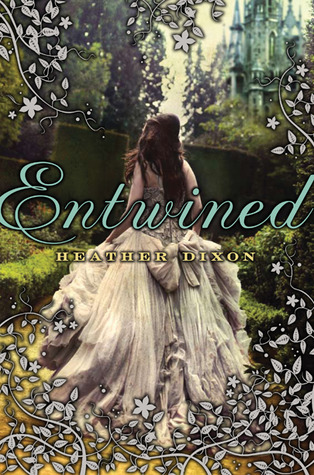 --Shiny Covers, Especially with Scroll Work--Entwined. Strands of Bronze and Gold. It's just soooo pretty. I may not actually read the book, but I will gaze at the cover for a while.
--Shiny Covers, Especially with Scroll Work--Entwined. Strands of Bronze and Gold. It's just soooo pretty. I may not actually read the book, but I will gaze at the cover for a while. --Gender Bendering--Mulan. Alanna. Deryn. There's just something about the disguise and the desperation that pushes them into the deceit and can I use any more D words? I love when a woman not just survives, but wins in a man's world.
--Archery--This stems from my secret desire to be a marksman and/or elf. Seriously Hunger Games, you write a book about a girl who hunts with a bow and you don't put that bow on the cover? Who cares about the symbolic resonance of the mockingjay? Arrows!
--Medival/Magic--Anything taking place in a medivalish world or that uses magic is bound to catch my eye, as you can tell by the fact that over a third of my books on Goodreads are shelved under medical or fantasy or both.
--Dragons--I can't even provide justification for this one. Dragons are cool. The end.
--Wolves--Mysterious. Majestic. Third M word. Ever since reading Julie of the Wolves, I've loved them, so wolves better feature positively in your story.
 --Hooded Figures--Hooded figures with partially obscured faces just look so mysterious on book covers. The hooded ranger on The Ruins of Gorlan is more than half the reason I read it. The other half was the quiver on his back
--Hooded Figures--Hooded figures with partially obscured faces just look so mysterious on book covers. The hooded ranger on The Ruins of Gorlan is more than half the reason I read it. The other half was the quiver on his back--Fairy Tale Retellings/Books About Books--I love these. LOVE. Diving into very one dimensional characters and giving them a back story. I don't know what it is. Reexamining older books/stories, is just intriguing.
--Brandon Sanderson--Not really a topic, but I will read anything he writes.
--A Really Interesting and Novel Premise--I know that includes everything, so it doesn't really mean anything, but really. Something original like genetically engineered war beasts and mech suits or teens being divided into their constituent parts or a Bluebeard retelling in antebellum South, something more than every other book piques my interest.
What are your buzz word/topics?
Subscribe to:
Posts (Atom)
